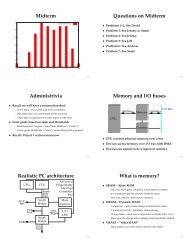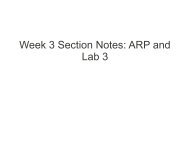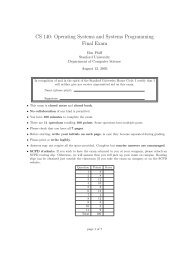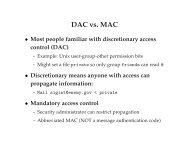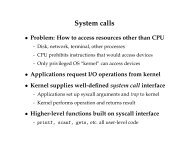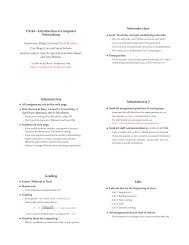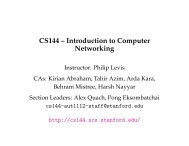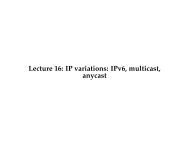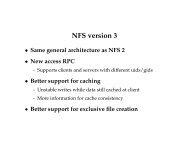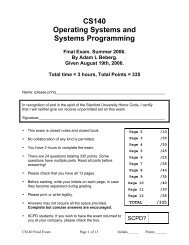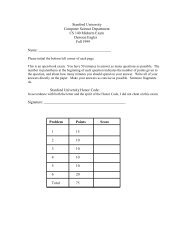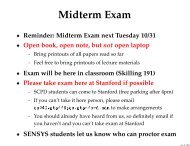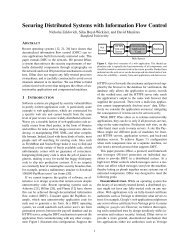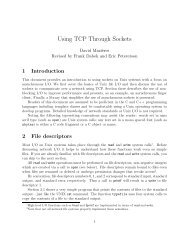- Page 2 and 3:
© 2002, 2003, 2004, 2005 Advanced
- Page 4 and 5:
AMD64 Technology 24594 Rev. 3.10 Fe
- Page 6 and 7:
AMD64 Technology 24594 Rev. 3.10 Fe
- Page 8:
AMD64 Technology 24594 Rev. 3.10 Fe
- Page 12 and 13:
AMD64 Technology 24594 Rev. 3.10 Fe
- Page 14 and 15:
AMD64 Technology 24594—Rev. 3.10
- Page 16 and 17:
AMD64 Technology 24594 Rev. 3.10 Fe
- Page 18 and 19:
AMD64 Technology 24594 Rev. 3.10 Fe
- Page 20 and 21:
AMD64 Technology 24594 Rev. 3.10 Fe
- Page 22 and 23:
AMD64 Technology 24594 Rev. 3.10 Fe
- Page 24 and 25:
AMD64 Technology 24594 Rev. 3.10 Fe
- Page 26 and 27:
AMD64 Technology 24594 Rev. 3.10 Fe
- Page 28 and 29:
AMD64 Technology 24594 Rev. 3.10 Fe
- Page 30 and 31:
AMD64 Technology 24594 Rev. 3.10 Fe
- Page 32 and 33:
AMD64 Technology 24594 Rev. 3.10 Fe
- Page 34 and 35:
AMD64 Technology 24594 Rev. 3.10 Fe
- Page 36 and 37:
AMD64 Technology 24594 Rev. 3.10 Fe
- Page 38 and 39:
AMD64 Technology 24594 Rev. 3.10 Fe
- Page 40 and 41:
AMD64 Technology 24594 Rev. 3.10 Fe
- Page 42 and 43:
AMD64 Technology 24594 Rev. 3.10 Fe
- Page 44 and 45:
AMD64 Technology 24594 Rev. 3.10 Fe
- Page 46 and 47:
AMD64 Technology 24594 Rev. 3.10 Fe
- Page 48 and 49:
AMD64 Technology 24594 Rev. 3.10 Fe
- Page 50 and 51:
AMD64 Technology 24594 Rev. 3.10 Fe
- Page 52 and 53:
AMD64 Technology 24594 Rev. 3.10 Fe
- Page 54 and 55:
AMD64 Technology 24594 Rev. 3.10 Fe
- Page 56 and 57:
AMD64 Technology 24594 Rev. 3.10 Fe
- Page 58 and 59:
AMD64 Technology 24594 Rev. 3.10 Fe
- Page 60 and 61:
AMD64 Technology 24594 Rev. 3.10 Fe
- Page 62 and 63:
AMD64 Technology 24594 Rev. 3.10 Fe
- Page 64 and 65:
AMD64 Technology 24594 Rev. 3.10 Fe
- Page 66 and 67:
AMD64 Technology 24594 Rev. 3.10 Fe
- Page 68 and 69:
AMD64 Technology 24594 Rev. 3.10 Fe
- Page 70 and 71:
AMD64 Technology 24594 Rev. 3.10 Fe
- Page 72 and 73:
AMD64 Technology 24594 Rev. 3.10 Fe
- Page 74 and 75:
AMD64 Technology 24594 Rev. 3.10 Fe
- Page 76 and 77:
AMD64 Technology 24594 Rev. 3.10 Fe
- Page 78 and 79:
AMD64 Technology 24594 Rev. 3.10 Fe
- Page 80 and 81:
AMD64 Technology 24594 Rev. 3.10 Fe
- Page 82 and 83:
AMD64 Technology 24594 Rev. 3.10 Fe
- Page 84 and 85:
AMD64 Technology 24594 Rev. 3.10 Fe
- Page 86 and 87:
AMD64 Technology 24594 Rev. 3.10 Fe
- Page 88 and 89:
AMD64 Technology 24594 Rev. 3.10 Fe
- Page 90 and 91:
AMD64 Technology 24594 Rev. 3.10 Fe
- Page 92 and 93:
AMD64 Technology 24594 Rev. 3.10 Fe
- Page 94 and 95:
AMD64 Technology 24594 Rev. 3.10 Fe
- Page 96 and 97:
AMD64 Technology 24594 Rev. 3.10 Fe
- Page 98 and 99:
AMD64 Technology 24594 Rev. 3.10 Fe
- Page 100 and 101:
AMD64 Technology 24594 Rev. 3.10 Fe
- Page 102 and 103:
AMD64 Technology 24594 Rev. 3.10 Fe
- Page 104 and 105:
AMD64 Technology 24594 Rev. 3.10 Fe
- Page 106 and 107:
AMD64 Technology 24594 Rev. 3.10 Fe
- Page 108 and 109:
AMD64 Technology 24594 Rev. 3.10 Fe
- Page 110 and 111:
AMD64 Technology 24594 Rev. 3.10 Fe
- Page 112 and 113:
AMD64 Technology 24594 Rev. 3.10 Fe
- Page 114 and 115:
AMD64 Technology 24594 Rev. 3.10 Fe
- Page 116 and 117:
AMD64 Technology 24594 Rev. 3.10 Fe
- Page 118 and 119:
AMD64 Technology 24594 Rev. 3.10 Fe
- Page 120 and 121:
AMD64 Technology 24594 Rev. 3.10 Fe
- Page 122 and 123:
AMD64 Technology 24594 Rev. 3.10 Fe
- Page 124 and 125:
AMD64 Technology 24594 Rev. 3.10 Fe
- Page 126 and 127:
AMD64 Technology 24594 Rev. 3.10 Fe
- Page 128 and 129:
AMD64 Technology 24594 Rev. 3.10 Fe
- Page 130 and 131:
AMD64 Technology 24594 Rev. 3.10 Fe
- Page 132 and 133:
AMD64 Technology 24594 Rev. 3.10 Fe
- Page 134 and 135:
AMD64 Technology 24594 Rev. 3.10 Fe
- Page 136 and 137:
AMD64 Technology 24594 Rev. 3.10 Fe
- Page 138 and 139:
AMD64 Technology 24594 Rev. 3.10 Fe
- Page 140 and 141:
AMD64 Technology 24594 Rev. 3.10 Fe
- Page 142 and 143:
AMD64 Technology 24594 Rev. 3.10 Fe
- Page 144 and 145:
AMD64 Technology 24594 Rev. 3.10 Fe
- Page 146 and 147:
AMD64 Technology 24594 Rev. 3.10 Fe
- Page 148 and 149:
AMD64 Technology 24594 Rev. 3.10 Fe
- Page 150 and 151:
AMD64 Technology 24594 Rev. 3.10 Fe
- Page 152 and 153:
AMD64 Technology 24594 Rev. 3.10 Fe
- Page 154 and 155:
AMD64 Technology 24594 Rev. 3.10 Fe
- Page 156 and 157:
AMD64 Technology 24594 Rev. 3.10 Fe
- Page 158 and 159:
AMD64 Technology 24594 Rev. 3.10 Fe
- Page 160 and 161:
AMD64 Technology 24594 Rev. 3.10 Fe
- Page 162 and 163:
AMD64 Technology 24594 Rev. 3.10 Fe
- Page 164 and 165:
AMD64 Technology 24594 Rev. 3.10 Fe
- Page 166 and 167:
AMD64 Technology 24594 Rev. 3.10 Fe
- Page 168 and 169:
AMD64 Technology 24594 Rev. 3.10 Fe
- Page 170 and 171:
AMD64 Technology 24594 Rev. 3.10 Fe
- Page 172 and 173:
AMD64 Technology 24594 Rev. 3.10 Fe
- Page 174 and 175:
AMD64 Technology 24594 Rev. 3.10 Fe
- Page 176 and 177:
AMD64 Technology 24594 Rev. 3.10 Fe
- Page 178 and 179:
AMD64 Technology 24594 Rev. 3.10 Fe
- Page 180 and 181:
AMD64 Technology 24594 Rev. 3.10 Fe
- Page 182 and 183:
AMD64 Technology 24594 Rev. 3.10 Fe
- Page 184 and 185:
AMD64 Technology 24594 Rev. 3.10 Fe
- Page 186 and 187:
AMD64 Technology 24594 Rev. 3.10 Fe
- Page 188 and 189:
AMD64 Technology 24594 Rev. 3.10 Fe
- Page 190 and 191:
AMD64 Technology 24594 Rev. 3.10 Fe
- Page 192 and 193:
AMD64 Technology 24594 Rev. 3.10 Fe
- Page 194 and 195:
AMD64 Technology 24594 Rev. 3.10 Fe
- Page 196 and 197:
AMD64 Technology 24594 Rev. 3.10 Fe
- Page 198 and 199:
AMD64 Technology 24594 Rev. 3.10 Fe
- Page 200 and 201:
AMD64 Technology 24594 Rev. 3.10 Fe
- Page 202 and 203:
AMD64 Technology 24594 Rev. 3.10 Fe
- Page 204 and 205:
AMD64 Technology 24594 Rev. 3.10 Fe
- Page 206 and 207:
AMD64 Technology 24594 Rev. 3.10 Fe
- Page 208 and 209:
AMD64 Technology 24594 Rev. 3.10 Fe
- Page 210 and 211:
AMD64 Technology 24594 Rev. 3.10 Fe
- Page 212 and 213:
AMD64 Technology 24594 Rev. 3.10 Fe
- Page 214 and 215:
AMD64 Technology 24594 Rev. 3.10 Fe
- Page 216 and 217:
AMD64 Technology 24594 Rev. 3.10 Fe
- Page 218 and 219:
AMD64 Technology 24594 Rev. 3.10 Fe
- Page 220 and 221:
AMD64 Technology 24594 Rev. 3.10 Fe
- Page 222 and 223:
AMD64 Technology 24594 Rev. 3.10 Fe
- Page 224 and 225:
AMD64 Technology 24594 Rev. 3.10 Fe
- Page 226 and 227:
AMD64 Technology 24594 Rev. 3.10 Fe
- Page 228 and 229:
AMD64 Technology 24594 Rev. 3.10 Fe
- Page 230 and 231:
AMD64 Technology 24594 Rev. 3.10 Fe
- Page 232 and 233:
AMD64 Technology 24594 Rev. 3.10 Fe
- Page 234 and 235:
AMD64 Technology 24594 Rev. 3.10 Fe
- Page 236 and 237:
AMD64 Technology 24594 Rev. 3.10 Fe
- Page 238 and 239:
AMD64 Technology 24594 Rev. 3.10 Fe
- Page 240 and 241:
AMD64 Technology 24594 Rev. 3.10 Fe
- Page 242 and 243:
AMD64 Technology 24594 Rev. 3.10 Fe
- Page 244 and 245:
AMD64 Technology 24594 Rev. 3.10 Fe
- Page 246 and 247:
AMD64 Technology 24594 Rev. 3.10 Fe
- Page 248 and 249:
AMD64 Technology 24594 Rev. 3.10 Fe
- Page 250 and 251:
AMD64 Technology 24594 Rev. 3.10 Fe
- Page 252 and 253:
AMD64 Technology 24594 Rev. 3.10 Fe
- Page 254 and 255:
AMD64 Technology 24594 Rev. 3.10 Fe
- Page 256 and 257:
AMD64 Technology 24594 Rev. 3.10 Fe
- Page 258 and 259:
AMD64 Technology 24594 Rev. 3.10 Fe
- Page 260 and 261:
AMD64 Technology 24594 Rev. 3.10 Fe
- Page 262 and 263:
AMD64 Technology 24594 Rev. 3.10 Fe
- Page 264 and 265:
AMD64 Technology 24594 Rev. 3.10 Fe
- Page 266 and 267:
AMD64 Technology 24594 Rev. 3.10 Fe
- Page 268 and 269:
AMD64 Technology 24594 Rev. 3.10 Fe
- Page 270 and 271:
AMD64 Technology 24594 Rev. 3.10 Fe
- Page 272 and 273:
AMD64 Technology 24594 Rev. 3.10 Fe
- Page 274 and 275:
AMD64 Technology 24594 Rev. 3.10 Fe
- Page 276 and 277:
AMD64 Technology 24594 Rev. 3.10 Fe
- Page 278 and 279:
AMD64 Technology 24594 Rev. 3.10 Fe
- Page 280 and 281:
AMD64 Technology 24594 Rev. 3.10 Fe
- Page 282 and 283:
AMD64 Technology 24594 Rev. 3.10 Fe
- Page 284 and 285:
AMD64 Technology 24594 Rev. 3.10 Fe
- Page 286 and 287:
AMD64 Technology 24594 Rev. 3.10 Fe
- Page 288 and 289:
AMD64 Technology 24594 Rev. 3.10 Fe
- Page 290 and 291:
AMD64 Technology 24594 Rev. 3.10 Fe
- Page 292 and 293:
AMD64 Technology 24594 Rev. 3.10 Fe
- Page 294 and 295:
AMD64 Technology 24594 Rev. 3.10 Fe
- Page 296 and 297:
AMD64 Technology 24594 Rev. 3.10 Fe
- Page 298 and 299:
AMD64 Technology 24594 Rev. 3.10 Fe
- Page 300 and 301:
AMD64 Technology 24594 Rev. 3.10 Fe
- Page 302 and 303:
AMD64 Technology 24594 Rev. 3.10 Fe
- Page 304 and 305:
AMD64 Technology 24594 Rev. 3.10 Fe
- Page 306 and 307:
AMD64 Technology 24594 Rev. 3.10 Fe
- Page 308 and 309:
AMD64 Technology 24594 Rev. 3.10 Fe
- Page 310 and 311:
AMD64 Technology 24594 Rev. 3.10 Fe
- Page 312 and 313:
AMD64 Technology 24594 Rev. 3.10 Fe
- Page 314 and 315:
AMD64 Technology 24594 Rev. 3.10 Fe
- Page 316 and 317:
AMD64 Technology 24594 Rev. 3.10 Fe
- Page 318 and 319:
AMD64 Technology 24594 Rev. 3.10 Fe
- Page 320 and 321:
AMD64 Technology 24594 Rev. 3.10 Fe
- Page 322 and 323:
AMD64 Technology 24594 Rev. 3.10 Fe
- Page 324 and 325:
AMD64 Technology 24594 Rev. 3.10 Fe
- Page 326 and 327:
AMD64 Technology 24594 Rev. 3.10 Fe
- Page 328 and 329:
AMD64 Technology 24594 Rev. 3.10 Fe
- Page 330 and 331:
AMD64 Technology 24594 Rev. 3.10 Fe
- Page 332 and 333:
AMD64 Technology 24594 Rev. 3.10 Fe
- Page 334 and 335:
AMD64 Technology 24594 Rev. 3.10 Fe
- Page 336 and 337:
AMD64 Technology 24594 Rev. 3.10 Fe
- Page 338 and 339:
AMD64 Technology 24594 Rev. 3.10 Fe
- Page 340 and 341:
AMD64 Technology 24594 Rev. 3.10 Fe
- Page 342 and 343:
AMD64 Technology 24594 Rev. 3.10 Fe
- Page 344 and 345:
AMD64 Technology 24594 Rev. 3.10 Fe
- Page 346 and 347:
AMD64 Technology 24594 Rev. 3.10 Fe
- Page 348 and 349:
AMD64 Technology 24594 Rev. 3.10 Fe
- Page 350 and 351:
AMD64 Technology 24594 Rev. 3.10 Fe
- Page 352 and 353:
AMD64 Technology 24594 Rev. 3.10 Fe
- Page 354 and 355:
AMD64 Technology 24594 Rev. 3.10 Fe
- Page 356 and 357:
AMD64 Technology 24594 Rev. 3.10 Fe
- Page 358 and 359:
AMD64 Technology 24594 Rev. 3.10 Fe
- Page 360 and 361:
AMD64 Technology 24594 Rev. 3.10 Fe
- Page 362 and 363:
AMD64 Technology 24594 Rev. 3.10 Fe
- Page 364 and 365:
AMD64 Technology 24594 Rev. 3.10 Fe
- Page 366 and 367:
AMD64 Technology 24594 Rev. 3.10 Fe
- Page 368 and 369:
AMD64 Technology 24594 Rev. 3.10 Fe
- Page 370 and 371:
AMD64 Technology 24594 Rev. 3.10 Fe
- Page 372 and 373:
AMD64 Technology 24594 Rev. 3.10 Fe
- Page 374 and 375:
AMD64 Technology 24594 Rev. 3.10 Fe
- Page 376 and 377:
AMD64 Technology 24594 Rev. 3.10 Fe
- Page 378 and 379:
AMD64 Technology 24594 Rev. 3.10 Fe
- Page 380 and 381:
AMD64 Technology 24594 Rev. 3.10 Fe
- Page 382 and 383:
AMD64 Technology 24594 Rev. 3.10 Fe
- Page 384 and 385:
AMD64 Technology 24594 Rev. 3.10 Fe
- Page 386 and 387:
AMD64 Technology 24594 Rev. 3.10 Fe
- Page 388 and 389:
AMD64 Technology 24594 Rev. 3.10 Fe
- Page 390 and 391:
AMD64 Technology 24594 Rev. 3.10 Fe
- Page 392 and 393:
AMD64 Technology 24594 Rev. 3.10 Fe
- Page 394 and 395:
AMD64 Technology 24594 Rev. 3.10 Fe
- Page 396 and 397:
AMD64 Technology 24594 Rev. 3.10 Fe
- Page 398 and 399:
AMD64 Technology 24594 Rev. 3.10 Fe
- Page 400 and 401:
AMD64 Technology 24594 Rev. 3.10 Fe
- Page 402 and 403:
AMD64 Technology 24594 Rev. 3.10 Fe
- Page 404 and 405:
AMD64 Technology 24594 Rev. 3.10 Fe
- Page 406 and 407:
AMD64 Technology 24594 Rev. 3.10 Fe
- Page 408 and 409:
AMD64 Technology 24594 Rev. 3.10 Fe
- Page 410 and 411:
AMD64 Technology 24594 Rev. 3.10 Fe
- Page 412 and 413:
AMD64 Technology 24594 Rev. 3.10 Fe
- Page 414 and 415:
AMD64 Technology 24594 Rev. 3.10 Fe
- Page 416 and 417:
AMD64 Technology 24594 Rev. 3.10 Fe
- Page 418 and 419:
AMD64 Technology 24594 Rev. 3.10 Fe
- Page 420 and 421:
AMD64 Technology 24594 Rev. 3.10 Fe
- Page 422 and 423:
AMD64 Technology 24594 Rev. 3.10 Fe
- Page 424 and 425:
AMD64 Technology 24594 Rev. 3.10 Fe
- Page 426 and 427:
AMD64 Technology 24594 Rev. 3.10 Fe
- Page 428 and 429:
AMD64 Technology 24594 Rev. 3.10 Fe
- Page 430 and 431:
AMD64 Technology 24594 Rev. 3.10 Fe
- Page 432 and 433: AMD64 Technology 24594 Rev. 3.10 Fe
- Page 434 and 435: AMD64 Technology 24594 Rev. 3.10 Fe
- Page 436 and 437: AMD64 Technology 24594 Rev. 3.10 Fe
- Page 438 and 439: AMD64 Technology 24594 Rev. 3.10 Fe
- Page 440 and 441: AMD64 Technology 24594 Rev. 3.10 Fe
- Page 442 and 443: AMD64 Technology 24594 Rev. 3.10 Fe
- Page 444 and 445: AMD64 Technology 24594 Rev. 3.10 Fe
- Page 446 and 447: AMD64 Technology 24594 Rev. 3.10 Fe
- Page 448 and 449: AMD64 Technology 24594 Rev. 3.10 Fe
- Page 450 and 451: AMD64 Technology 24594 Rev. 3.10 Fe
- Page 452 and 453: AMD64 Technology 24594 Rev. 3.10 Fe
- Page 454 and 455: AMD64 Technology 24594 Rev. 3.10 Fe
- Page 456 and 457: AMD64 Technology 24594 Rev. 3.10 Fe
- Page 458 and 459: AMD64 Technology 24594 Rev. 3.10 Fe
- Page 460 and 461: AMD64 Technology 24594 Rev. 3.10 Fe
- Page 462 and 463: AMD64 Technology 24594 Rev. 3.10 Fe
- Page 464 and 465: AMD64 Technology 24594 Rev. 3.10 Fe
- Page 466 and 467: AMD64 Technology 24594 Rev. 3.10 Fe
- Page 468 and 469: AMD64 Technology 24594 Rev. 3.10 Fe
- Page 470 and 471: AMD64 Technology 24594 Rev. 3.10 Fe
- Page 472 and 473: AMD64 Technology 24594 Rev. 3.10 Fe
- Page 474 and 475: AMD64 Technology 24594 Rev. 3.10 Fe
- Page 476 and 477: AMD64 Technology 24594 Rev. 3.10 Fe
- Page 478 and 479: AMD64 Technology 24594 Rev. 3.10 Fe
- Page 480 and 481: AMD64 Technology 24594 Rev. 3.10 Fe
- Page 484 and 485: AMD64 Technology 24594 Rev. 3.10 Fe
- Page 486 and 487: AMD64 Technology 24594 Rev. 3.10 Fe
- Page 488 and 489: AMD64 Technology 24594 Rev. 3.10 Fe
- Page 490 and 491: AMD64 Technology 24594 Rev. 3.10 Fe
- Page 492 and 493: AMD64 Technology 24594 Rev. 3.10 Fe
- Page 494 and 495: AMD64 Technology 24594 Rev. 3.10 Fe
- Page 496 and 497: AMD64 Technology 24594 Rev. 3.10 Fe
- Page 498 and 499: AMD64 Technology 24594 Rev. 3.10 Fe
- Page 500 and 501: AMD64 Technology 24594 Rev. 3.10 Fe
- Page 502 and 503: AMD64 Technology 24594 Rev. 3.10 Fe
- Page 504 and 505: AMD64 Technology 24594 Rev. 3.10 Fe
- Page 506 and 507: AMD64 Technology 24594 Rev. 3.10 Fe
- Page 508 and 509: AMD64 Technology 24594 Rev. 3.10 Fe
- Page 510 and 511: AMD64 Technology 24594 Rev. 3.10 Fe
- Page 512 and 513: AMD64 Technology 24594 Rev. 3.10 Fe
- Page 514 and 515: AMD64 Technology 24594 Rev. 3.10 Fe
- Page 516 and 517: AMD64 Technology 24594 Rev. 3.10 Fe
- Page 518 and 519: AMD64 Technology 24594 Rev. 3.10 Fe
- Page 520 and 521: AMD64 Technology 24594 Rev. 3.10 Fe
- Page 522 and 523: AMD64 Technology 24594 Rev. 3.10 Fe
- Page 524 and 525: AMD64 Technology 24594 Rev. 3.10 Fe
- Page 526 and 527: AMD64 Technology 24594 Rev. 3.10 Fe
- Page 528 and 529: AMD64 Technology 24594 Rev. 3.10 Fe
- Page 530 and 531: AMD64 Technology 24594 Rev. 3.10 Fe
- Page 532 and 533:
AMD64 Technology 24594 Rev. 3.10 Fe
- Page 534:
AMD64 Technology 24594 Rev. 3.10 Fe



